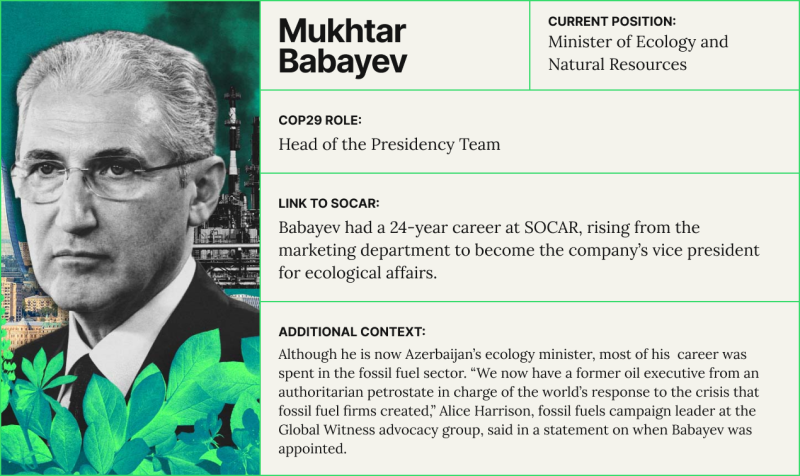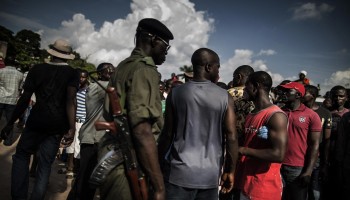At least four officials with ties to Azerbaijan’s state oil company have been given major roles in organizing the upcoming COP29 climate conference in Baku, underscoring “greenwashing” concerns highlighted by transparency campaigners.
Environmental activists have criticized the choice of oil-dependent Azerbaijan to host the United Nations conference, which brings together world leaders to negotiate plans to tackle global warming.
Earlier this year, the country’s President Ilham Aliyev said that Azerbaijan’s oil reserves were “a gift from God” and argued that his country had a “responsibility” to boost oil and gas exports to serve European markets.
In a report last week, Transparency International and the Anti-Corruption Data Collective raised concerns that the oil company, SOCAR — which has been embroiled in corruption scandals for decades — could use the COP29 conference to “greenwash” its image while quietly making deals to expand fossil fuel production.
The conference, which begins on Monday, is set to run for 11 days in Baku, the capital of Azerbaijan.
The U.N. Framework Convention on Climate Change, which governs the conference, “lacks robust guardrails against corporate and fossil fuel influence in the host country’s organization of COP,” the report says.
In addition, host countries are not required to adopt measures to reveal conflicts of interest. As a result, there are “currently few obstacles to attempts to influence or capture new investments” by members of the conference’s organizing committee.
Indeed, the BBC reported today that one of the four SOCAR officials with a senior COP29 role, Elnur Soltanov, has been secretly filmed appearing to trade on his position to discuss fossil fuel deals. (He did not respond to a request for comment.)
SOCAR's headquarters in Baku, the capital of Azerbaijan.
Aliyev set up the COP29 organizing committee, which oversees all the conference’s logistical arrangements and manages cooperation with international partners, in January, naming 28 men to the body, including several with direct ties to SOCAR.
After the initial announcement, critical press coverage pointed out that the lineup included no women, apparently prompting Aliyev to reappraise the committee’s makeup. One male SOCAR official was removed from the group, and 18 women were added.
As the so-called “President” of this year’s event, Azerbaijan also has a separate, smaller Presidency team tasked with leading the conference and “developing a vision for the best possible outcome of the meeting.”
The four remaining officials with ties to SOCAR are split between these two groups.
Mukhtar Babayev, who will lead the COP29 climate talks as the head of this Presidency team, is a former SOCAR executive, while COP29’s chief executive officer, Deputy Energy Minister Elnur Soltanov, is a member of the SOCAR board. The chair of that board, Azerbaijan’s Economy Minister Mikayil Jabbarov, is a COP organizing committee member, as is SOCAR’s president, Rovshan Najaf.
None of them responded to requests for comment.
Aliyev himself is a former SOCAR executive, and at times his personal interests have been intertwined with those of the state company: Previous reporting by OCCRP has found that he and other top officials made free use of two SOCAR-owned yachts to cruise the Mediterranean, and that his family listed SOCAR’s headquarters as their address when purchasing a high-end London home.
The company has also figured in a number of corruption scandals. In 2012, multiple German media outlets reported that SOCAR made illegal political donations to Germany’s Christian Democratic Union. U.S. Representative Henry Cuellar was indicted earlier this year for accepting over $360,000 from SOCAR in exchange for advocating on Azerbaijan’s behalf, including trying to influence legislation and speaking in favor of Azerbaijan on the floor of the U.S. House of Representatives. (He has denied wrongdoing.)
A 2022 investigation by OCCRP found that SOCAR attempted to use subsidiaries to siphon off $1.7 billion from Shah Deniz 2, an expansion of U.K. oil giant BP’s operations in the Caspian Sea.
This is not the first time the COP conference has come under criticism for allowing heavy representation of fossil fuel interests. Last year, media outlets exposed how the boss of the United Arab Emirates national oil company used the summit — which took place in Dubai — to lobby for oil and gas deals with foreign officials.
Kate Watters, director of the environmental group Crude Accountability, said climate advocates were concerned this could happen again, given “such a prominent presence of former and current SOCAR representatives on the COP29 organizing committee, and following the President’s statement that Azerbaijan intends to grow its fossil fuel investments.”
Neither SOCAR nor the COP29 Presidency office responded to requests for comment.
A Lack of Transparency
Unlike many other countries, Azerbaijan does not require government officials to make public declarations of their assets or business holdings, making it particularly difficult to spot conflicts of interest.
Information about company owners and shareholders is also not publicly available in Azerbaijan. In the lead-up to the COP, Azerbaijan also restricted access to the Ministry of Tax website so it could only be viewed inside the country. Journalists in exile often use the site to glean company information, including the names of representatives or changes in capital allocation, although it is not possible to see who owns the companies.
But some COP29 committee members have been reported to have business interests that may conflict with their roles organizing the event.
For example, the children of one organizing committee member, Kamaladdin Heydarov, had an interest in the major conglomerate Gilan Holding alongside President Aliyev’s daughters, OCCRP found in 2018.
Although Gilan was dissolved last year, a textile company that long belonged to the holding, GILTEX, was recently named an official corporate partner of the COP29 event. These official partners gain access to special marketing and networking opportunities in an area of the conference dubbed the “Green Zone.”
(Reporters could not confirm who currently owns GILTEX since company ownership information is not open to the public, but in 2022, OCCRP member center Meydan TV reported that many companies previously part of Gilan Holding were being transferred to another holding company owned by the president’s daughters.)
Another member of the organizing committee, Balababa Rzayev, is a longtime player in Azerbaijan’s electrical sector. Earlier this year, OCCRP reported on how his son Fuad had made business deals with a Georgian businessman whose companies handled the export of Azerbaijani electricity into Georgia. (Fuad Rzayev told reporters at the time that his business activities had nothing to do with his father’s work, and didn’t involve a conflict of interest. Balababa Rzayev did not respond to a request for comment.)
Human rights groups have also raised alarms over the inclusion on the COP29 organizing committee of people tied to government bodies implicated in repression of Azerbaijani citizens.
Azerbaijan is the most authoritarian state ever to host a COP event, according to the rights group Freedom House. Power has been concentrated in the hands of the Aliyev family since the country gained independence from the Soviet Union in the early 1990s, and government critics are frequently targeted by state security services, according to human rights groups.
“The authorities have carried out an extensive crackdown on civil liberties in recent years, leaving little room for independent expression or activism,” Freedom House says of Azerbaijan.
In the months leading up to a snap election in February this year, Aliyev’s government arrested dozens of critics, including whistleblowers, academics, and journalists working for Abzas Media, one of the country’s few remaining independent media outlets.
The State Security Service, Azerbaijan’s main domestic intelligence agency, has been accused of monitoring and repressing civil society activists and dissidents. Last year, a journalist said he was threatened with rape by its agents during an interrogation.
An open letter signed by 145 international civil society groups in March this year called it “highly problematic” that the head of this agency, Ali Naghiev, was an organizing committee member. The groups said giving a role to the State Security Service on the body could intimidate journalists, activists, and other participants in the event, and have a “chilling effect” on free speech and assembly.
With control over the country’s police, Azerbaijan’s Ministry of Internal Affairs plays a central role in the Aliyev regime’s repressive apparatus. Its leader, Vilayat Eyvazov, is another member of the COP organizing committee. Neither he nor Naghiyev responded to requests for comment.
“Azerbaijan is hosting an international conference on climate justice while actively undermining the main pillars of climate activism — repressing all forms of critical expression and protests and dismantling local civil society,” said Agnès Callamard, the secretary general of Amnesty International, in a statement last month.
Amnesty also expressed concern that regime critics could be harshly dealt with as the government in Baku tries to show off the country in its best light ahead of the COP event.
“We urge every delegation attending COP29 to press the Azerbaijani government to end its clampdown on civil society, guarantee the rights to freedom of expression, association and peaceful assembly throughout and beyond the conference,” Callamard said.














